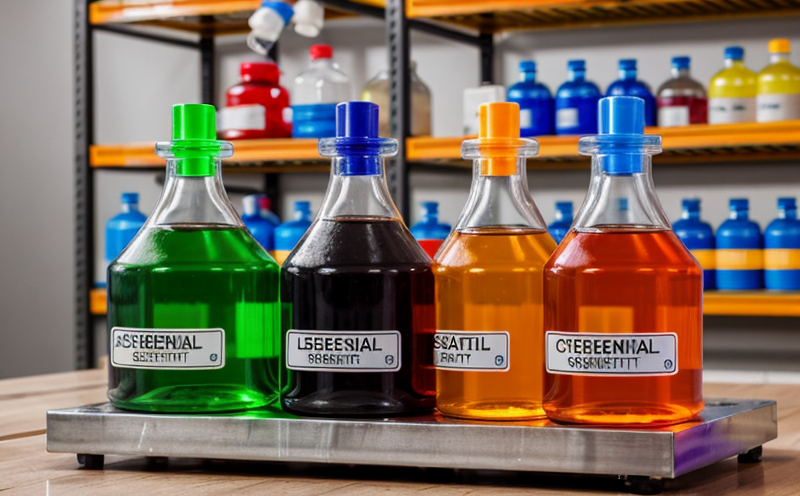PCP (Pentachlorophenol) Testing in Textiles and Leather
The presence of pentachlorophenol (PCP) in textiles and leather products is a concern due to its potential for adverse health effects, particularly when the product comes into prolonged contact with human skin. PCP has been classified as a toxic chemical under various environmental protection laws globally. This service specifically addresses the testing requirements for identifying and quantifying PCP residues in textile and leather goods.
Quality managers, compliance officers, R&D engineers, and procurement teams often face challenges ensuring their products meet stringent regulations and safety standards. The presence of PCP can lead to significant regulatory issues if not addressed during product development or production stages. This service provides comprehensive testing solutions to ensure the safety of textiles and leather goods.
Our laboratory adheres strictly to international standards such as ISO 17025, ensuring that our results are reliable and traceable. The testing process involves several critical steps, including sample preparation, extraction, and analysis using advanced chromatographic techniques. This ensures accurate detection of PCP residues even in minute quantities.
Regulatory requirements for PCP vary by jurisdiction but generally require compliance with limits set to protect human health and the environment. Our expertise lies in providing precise testing that meets these regulatory thresholds. By leveraging our state-of-the-art facilities, we can offer rapid turnaround times without compromising on accuracy or precision.
The importance of this service extends beyond mere compliance; it ensures brand integrity by maintaining consumer trust. In an era where sustainability and ethical sourcing are paramount, demonstrating a commitment to eliminating harmful substances like PCP is crucial for businesses operating in today’s competitive market.
Our comprehensive approach includes not only testing but also providing insights into best practices for preventing the introduction of PCP during manufacturing processes. This proactive stance helps our clients stay ahead of regulatory changes and maintain their reputation as leaders in responsible production.
We understand that each product has unique characteristics, which is why we tailor our services to meet specific needs. Whether it’s identifying sources of contamination or implementing strategies to reduce the risk of PCP presence, our team works closely with clients to find solutions that fit their particular circumstances.
Applied Standards
The testing for PCP in textiles and leather follows established standards aimed at ensuring product safety. Some key international standards include:
- ISO 17025 – This standard ensures the competence of the laboratory performing tests, providing confidence in our results.
- OEKO-TEX Standard 100 – A globally recognized safety label for textiles that guarantees a high level of human health and environmental protection throughout the supply chain. It explicitly includes limitations on PCP usage.
- EN 735 – This European standard specifies the methods for determining certain specific chemicals, including PCP, in textile materials.
In addition to these standards, local regulations may impose additional requirements depending on the destination market. For instance, the U.S. Consumer Product Safety Commission (CPSC) and China’s National Standards (GB/T 19527 series) both have specific guidelines for PCP in consumer products.
Scope and Methodology
The scope of our PCP testing service encompasses a wide range of textile and leather items, from clothing fabrics to footwear components. Our methodology is designed to ensure thorough examination while adhering to the highest standards of accuracy and reliability. Here’s an overview:
- Sample Preparation – Samples are carefully selected based on their intended use and expected exposure scenarios. This may involve cutting pieces from larger garments or selecting specific parts of leather goods.
- Extraction Process – The extracted samples undergo thorough extraction to ensure all PCP residues are captured for analysis. Extraction solvents and conditions are chosen to maximize recovery rates without introducing interference.
- Analysis Techniques – Advanced chromatographic methods such as High Performance Liquid Chromatography (HPLC) coupled with Mass Spectrometry (MS) are employed to detect and quantify PCP residues. These techniques provide high sensitivity, allowing us to identify even trace amounts of the compound.
- Data Interpretation – Results are interpreted against regulatory limits provided by relevant standards and local regulations. Any findings exceeding these thresholds require detailed analysis to determine potential sources of contamination.
The entire process is meticulously documented, ensuring transparency and reproducibility. Our reports provide clients with comprehensive information about the tested products, including any detected PCP residues along with recommendations for improvement if necessary.
Environmental and Sustainability Contributions
- Promoting Safe Product Use – By identifying and removing PCP from textiles and leather goods, we contribute to safer consumer experiences. This reduces the risk of harmful exposure through prolonged skin contact.
- Supporting Sustainable Practices – Ensuring compliance with environmental regulations helps businesses adopt more sustainable practices throughout their supply chains. It encourages responsible sourcing and production methods that minimize harm to both humans and ecosystems.
- Encouraging Regulatory Compliance – Helping companies meet stringent regulatory requirements fosters a culture of adherence to international standards, promoting fair trade and ethical business practices.
Our commitment to these areas aligns with broader industry efforts towards reducing environmental impact while enhancing product safety. Through our testing services, we play an integral role in driving positive change within the textile and leather sectors.





